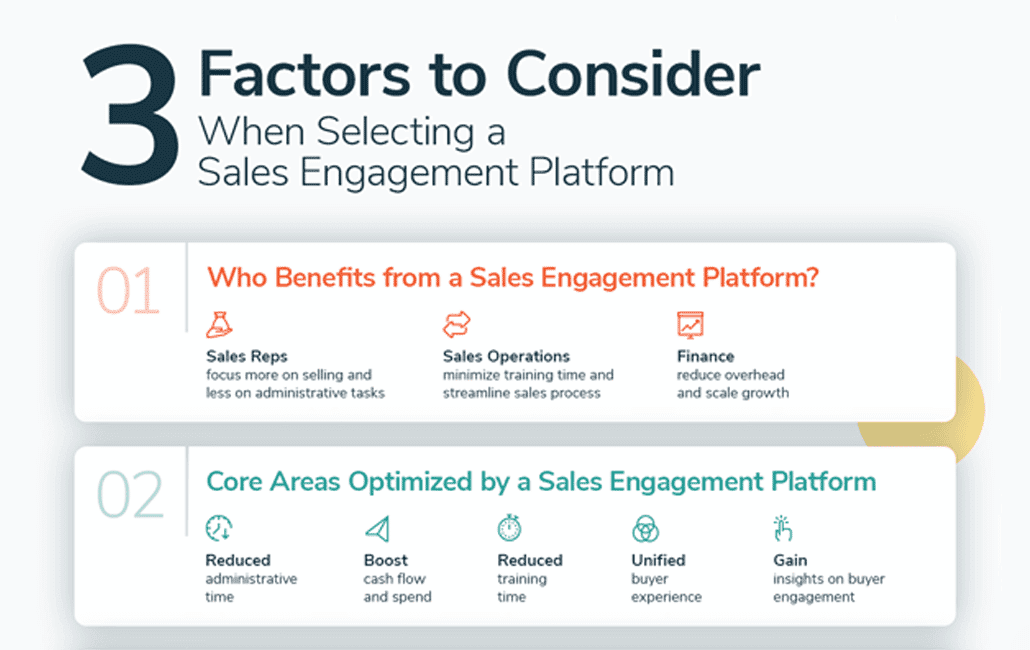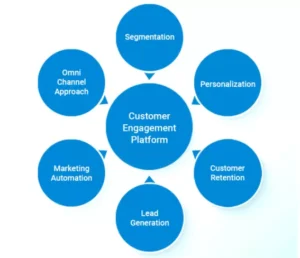Opting for the right sales engagement platform for your business involves considering factors such as your specific requirements, ease of use, integration capabilities, and pricing plans. This article will guide you through the process of selecting the most suitable platform to enhance your sales activities and boost your business’s performance.
Sales engagement platforms have become increasingly central to modern sales teams, providing a wide range of features and functionalities to streamline and optimize their processes. Advances in technology have enabled these platforms to offer tools for sales automation, communication tracking, and analytics, among others.
However, with countless options available in the market, it can be overwhelming to determine the best fit for your organization. By following certain key considerations and evaluating the features of different platforms, you can make an informed decision that aligns with your business objectives and helps drive revenue growth.

Credit: www.podia.com
Understanding Sales Engagement Platforms
When it comes to optimizing your sales process and boosting team productivity, sales engagement platforms are the secret weapon you need. These powerful tools automate and streamline key sales activities, empowering your team to focus on what they do best: closing deals. In this article, we will explore what sales engagement platforms are, why businesses need them, and the key features that set them apart.
What Are Sales Engagement Platforms?
Sales engagement platforms are all-in-one solutions designed to streamline and enhance the sales process. They integrate various tools and technologies into a single platform, providing you with a comprehensive suite of features tailored to support your sales team. These platforms enable you to manage your sales activities, engage prospects, and track customer interactions in a centralized and efficient manner.
Why Do Businesses Need Sales Engagement Platforms?
Businesses of all sizes can benefit from implementing a sales engagement platform. These platforms revolutionize the way you manage your sales process by equipping your team with the tools they need to succeed. Here are some key reasons why businesses need sales engagement platforms:
- Improved efficiency: Sales engagement platforms automate repetitive tasks and streamline workflows, enabling your team to focus on high-value activities.
- Enhanced collaboration: These platforms foster collaboration among team members, facilitating knowledge sharing and alignment across departments.
- Increased visibility: Sales engagement platforms provide real-time insights into sales activities and performance, empowering you to make data-driven decisions.
- Better customer engagement: With comprehensive customer profiles and personalized communication capabilities, these platforms help you engage and nurture leads effectively.
- Scalability: As your business grows, sales engagement platforms can grow with you, adapting to your evolving needs and supporting increased sales volumes.
Key Features Of Sales Engagement Platforms
Sales engagement platforms are equipped with a range of features designed to optimize your sales process. Here are some key features you should look for when choosing the right platform for your business:
- CRM integration: Seamless integration with your existing CRM system ensures that all customer data is centralized and accessible.
- Email automation: Automated email sequences allow you to engage prospects at scale while maintaining a personalized touch.
- Call management: Efficient call tracking, recording, and analytics enable you to monitor and improve your team’s phone outreach activities.
- Task management: Streamlined task management capabilities keep your team organized and ensure that no follow-ups or deadlines are missed.
- Content library: A centralized content library empowers your team with easy access to sales collateral, templates, and scripts.
- Analytics and reporting: Comprehensive analytics and reporting features provide valuable insights into sales performance and enable continuous improvement.
Factors To Consider In Choosing A Sales Engagement Platform
Choosing the right sales engagement platform is crucial for the success of your business. With so many options available in the market, it can be overwhelming to decide which one is best suited for your specific needs. To help you make an informed decision, consider these key factors:
Identifying Your Business Needs
Before selecting a sales engagement platform, it’s important to identify your business needs and goals. Consider the size of your sales team, the nature of your product or service, and the specific objectives you want to achieve through the platform. By clearly defining your requirements, you can narrow down your options and find a solution that aligns with your unique business needs.
Scalability And Customization
As your business grows, your sales engagement platform needs to keep pace. Look for a platform that offers scalability, allowing you to easily add or remove users, features, and functionalities as your requirements change. Additionally, customization capabilities are essential as they allow you to tailor the platform to your specific workflows and processes, ensuring maximum efficiency and productivity.
Integration With Existing Systems
Your sales engagement platform should seamlessly integrate with your existing systems and tools. Whether it’s your CRM software, email client, or marketing automation platform, the ability to sync data and workflows across different platforms is crucial for streamlining processes. Look for a platform that offers robust integration capabilities or has pre-built integrations with the tools you already use.
User Experience And Ease Of Implementation
The user experience of the sales engagement platform is of utmost importance. Your sales team needs to find it intuitive, easy to navigate, and learn. An overly complicated platform can hinder adoption and productivity. Additionally, consider the ease of implementation – how quickly can your team start using the platform and how much support is provided during the onboarding process.
Tracking And Analytics Capabilities
A sales engagement platform should provide comprehensive tracking and analytics capabilities to help you monitor and measure the effectiveness of your sales efforts. Look for features such as email tracking, call analytics, and engagement metrics. These insights allow you to identify what’s working, make data-driven decisions, and continuously improve your sales strategies.
Security And Compliance Measures
Protecting your data and ensuring compliance with industry regulations is a top priority. When evaluating a sales engagement platform, inquire about their security measures, including encryption protocols, access controls, and data backup processes. Additionally, consider the platform’s compliance with regulations like GDPR or CCPA, depending on your geographical location.
Cost And Pricing Models
Finally, consider the cost and pricing models of the sales engagement platforms you’re considering. Determine whether they offer flexible plans that align with your budget and requirements. Some platforms may charge per user, while others may have a flat fee or offer different tiers of features. Evaluate the value provided by each platform in relation to its cost to find the most cost-effective solution for your business.
Comparing Top Sales Engagement Platforms
Choosing the right sales engagement platform for your business is crucial for optimizing your sales processes and driving revenue growth. With a plethora of options available in the market, understanding the features, pros, and cons of each platform is essential. In this article, we will compare three top sales engagement platforms, exploring their unique offerings and helping you make an informed decision.
Platform 1 – Features, Pros, And Cons
Platform 1 is renowned for its comprehensive set of features designed to enhance sales productivity and efficiency. Its key features include:
- Email automation: Streamline your email outreach process and send personalized messages at scale.
- Integrated CRM: Seamlessly sync your sales engagement activities with your customer relationship management system for enhanced data management.
- Analytics and reporting: Gain valuable insights into your team’s performance and track the effectiveness of your sales campaigns.
- Task management: Organize and prioritize your sales tasks, ensuring that no opportunity falls through the cracks.
While Platform 1 offers a wide range of features, its pros and cons are as follows:
| Pros | Cons |
|---|---|
| Intuitive user interface | High subscription cost |
| Robust customization options | Steep learning curve for beginners |
| Excellent customer support | Some advanced features may require additional configuration |
Platform 2 – Features, Pros, And Cons
Platform 2 stands out for its cutting-edge features that empower sales teams to achieve exceptional results. These features include:
- Call analytics: Track call metrics, such as call duration and success rates, to identify areas for improvement.
- Social media integration: Leverage social platforms to engage with prospects and gain valuable market insights.
- Sequence automation: Automate multi-step outreach sequences to nurture leads and drive conversions.
- Mobile accessibility: Stay productive on the go with a mobile-responsive interface.
Consider the following when assessing the pros and cons of Platform 2:
| Pros | Cons |
|---|---|
| Advanced call analytics | Limited integration options with certain CRMs |
| Seamless integration with social media platforms | Higher subscription cost for additional users |
| Efficient automation capabilities | Limited customization options |
Platform 3 – Features, Pros, And Cons
Platform 3 offers a range of features geared towards maximizing sales productivity and driving revenue growth. Its notable features include:
- Prospecting tools: Identify and target high-potential prospects with advanced search and filtering options.
- Email tracking: Receive real-time notifications when prospects interact with your emails, enabling timely follow-ups.
- Task automation: Automate repetitive sales tasks, freeing up valuable time for more strategic activities.
- Integrations: Seamlessly connect with popular CRM and email platforms to streamline your workflows.
Consider the following pros and cons while evaluating Platform 3:
| Pros | Cons |
|---|---|
| Powerful prospecting tools | Interface can be overwhelming for some users |
| Comprehensive email tracking capabilities | Advanced features may require additional training |
| Seamless integrations with popular platforms | Price point may not be suitable for small businesses |

Credit: dealhub.io

Credit: www.bigcommerce.com
Frequently Asked Questions Of How To Choose The Right Sales Engagement Platform For Your Business
How Do I Choose A Sales Engagement Platform?
To choose a sales engagement platform, consider your specific needs, such as integration capabilities, customization options, and reporting features. Evaluate platforms based on user reviews, pricing, and customer support. Ensure it aligns with your sales team’s requirements and goals. Don’t forget to request demos or trials to test usability and functionality.
How Do I Choose A Customer Engagement Platform?
Choose a customer engagement platform by following these guidelines: 1. Define your objectives and requirements. 2. Evaluate features and functionality. 3. Consider scalability and integration options. 4. Assess data security and privacy measures. 5. Compare pricing and support options. By considering these factors, you can select the right customer engagement platform for your business.
What Is The Sales Engagement Platform?
A sales engagement platform is a tool that helps businesses streamline and automate their sales interactions. It enables sales teams to effectively engage with prospects and customers by providing features like email tracking, call recording, and performance analytics. This platform enhances sales productivity and improves customer relationships.
What Is The Difference Between Crm And Sales Engagement Platform?
CRM and sales engagement platforms serve different purposes. CRM focuses on managing customer relationships and centralizing data, while sales engagement platforms enhance sales productivity by automating tasks like email tracking and scheduling.
Conclusion
As you evaluate sales engagement platforms for your business, keep in mind the importance of features like analytics, integration capabilities, and user-friendly interfaces. Ensure the platform aligns with your specific needs and goals, considering your team’s requirements and preferences. Taking the time to conduct thorough research and make an informed decision will ultimately result in improved sales effectiveness and increased revenue.
Trust your instincts and choose wisely, knowing that a well-chosen sales engagement platform can make a significant impact on your organization’s success.




